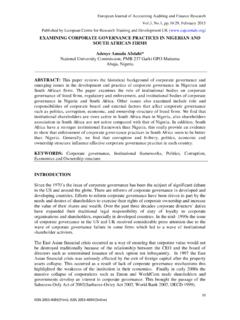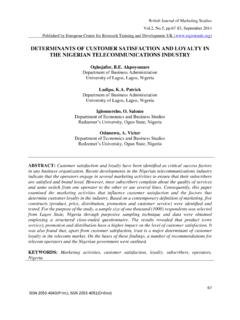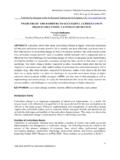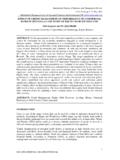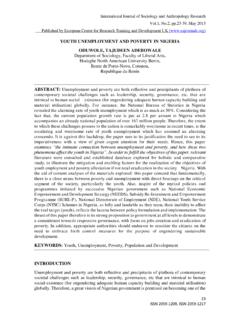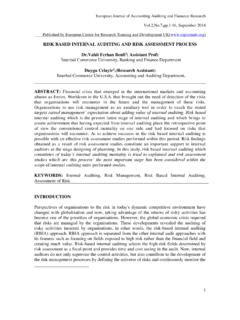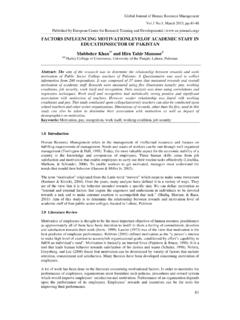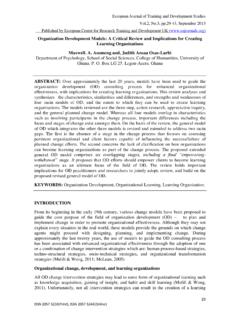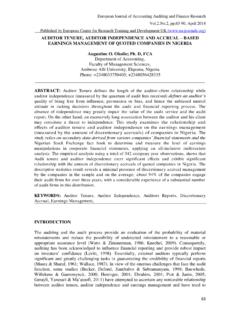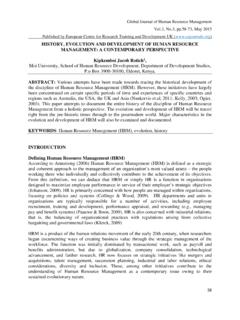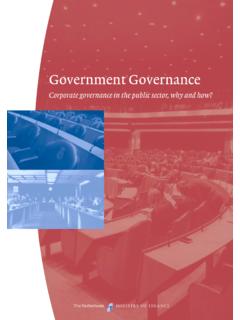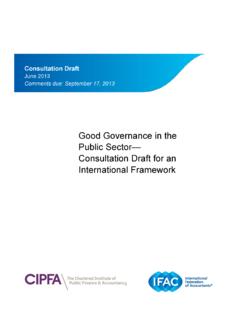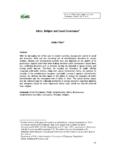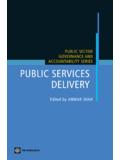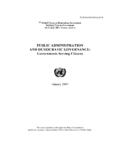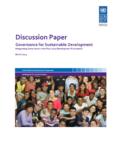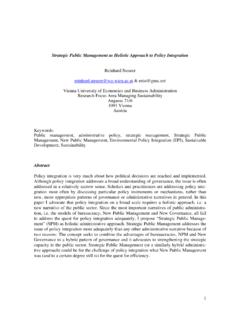Transcription of GOVERNANCE REFORM AND PUBLIC …
1 International Journal of Development and Economic Sustainability , , , March 2015 Published by European Centre for Research Training and Development UK ( ) 18 GOVERNANCE REFORM AND PUBLIC PROCUREMENT LAW REGIME IN NIGERIAN FEDERATING STATES: A CASE STUDY OF OYO STATE Dr Adeyeye Adewole Ondo State University of Science and Technology, Okitipupa, Ondo State, Nigeria ABSTRACT: PUBLIC procurement law regime is a veritable GOVERNANCE REFORM mechanism that seeks to institutionalize transparency, accountability, probity and zero-corruption in PUBLIC procurement system. The federating states and local governments across Nigeria are under pressure to embark on GOVERNANCE REFORM .
2 One of the key components of GOVERNANCE reforms is institutionalization of PUBLIC procurement law regime in line with the federal government by both the state and local tiers of government. Unfortunately, most states in Nigeria have strong apathy and are unwilling to subscribe due to chronic corrupt tendencies of political class who are averse to change on one hand and mostly due to knowledge gap on their expectations of PUBLIC procurement law regimes. Using Oyo state as a case-study, the paper X-ray some of the basic features and expectations of PUBLIC procurement law regime. It observes that procurement law regime seek to achieve the purpose of good GOVERNANCE through institutionalization of standard procurement practices.
3 It conclude by allaying fears of federating states and local government across Nigeria insisting that procurement law regime enhances proper GOVERNANCE as well as safeguard officials from likely repercussions of operating without standard procurement regulatory framework KEYWORDS: Nigeria, GOVERNANCE REFORM , Procurement law, States and Local Governments INTRODUCTION There are critical concerns among experts in the role of GOVERNANCE REFORM as antidotes to national growth and development Kaufinann (2003) Sebestian, (2006). Other concerns have to do with what incentives and the plethora of REFORM agenda that could be deployed in PUBLIC management system.
4 Along this line, various studies have been conducted on the types of GOVERNANCE reforms that are available as ways of enhancing sustainable growth and development of countries and states. However, there still exists wide knowledge-gap in PUBLIC administration and GOVERNANCE issues as to why some countries and states in country specific may deliberately choose not to adopt good GOVERNANCE practices in view of the inherent benefits to the growth and development of their countries. In African Developing countries for instance, the adoption of good GOVERNANCE practices has been taken too long a time to take root. Some countries and state across Africa are foot dragging even in a situation where it is obvious that good GOVERNANCE mechanism promises speedy avenue to ensure that their countries stands to grow and achieve desirable sustainable growth and development.
5 This seems to be the experience of Nigeria and her federating states in the case of PUBLIC procurement REFORM agenda. The PUBLIC procurement law regime have proved to be a veritable good GOVERNANCE mechanism which seeks to streamline, legalise and institutionalize PUBLIC procurement practices in order to achieve the objectives of transparency, accountability, probity and anti-corruption. While the Federal government of Nigeria has tried to adopt PUBLIC International Journal of Development and Economic Sustainability , , , March 2015 Published by European Centre for Research Training and Development UK ( ) 19 procurement law regime to achieve the goal of good GOVERNANCE most of the 36 federating states seems not interested.
6 Some federating states have out-rightly refused to adopt PUBLIC procurement regime as a good GOVERNANCE mechanism. Others who tried to adopt the agenda did it halfheartedly by whittling down the force of the law. A key reason for this is that the status quo benefits the political class. Seember (2012) This situation has aggravated under development crisis, it has stunted growth and engender poverty in concerned African countries or states. The study is an expository analysis on the problems of adopting PUBLIC procurement law regime by federating states in Nigeria as part of desirable good GOVERNANCE REFORM agenda to fast track national sustainable growth and development.
7 The study is significance because it attempt to bridge knowledge gap on the failure to implement good GOVERNANCE agenda in developing countries. Essentially, it contributes to knowledge as to why political class prefer status quo rather than adopt and implement GOVERNANCE REFORM . Specifically, the study attempts to showcase the experience of Nigerian state that has adopted PUBLIC procurement REFORM agenda and what recalcitrant states stand to lose in their stubborn disdain for GOVERNANCE REFORM . PUBLIC Procurement REFORM as a Good GOVERNANCE REFORM Agenda in Nigeria.\\ The Nigerian nation is in dire need of structural reforms in key aspects of her national life.
8 She needs structural reforms in order to shore up her development horizon. There is urgent need for GOVERNANCE REFORM in order to attain desired growth and national development. This because Nigeria has been confronted with excruciating development challenges since 1960 when she obtained independence. Adeyeye. (2005). Some of Nigerian development challenges include poverty, political instability, monolithic economic structure, food insecurity, weak technology base, uncontrolled pollution, illiteracy, social insecurity, ethnic rivalry etc. More critical to national growth are also the problems of bad leadership, corruption and weak institutional framework which are necessary for sustainable national development.
9 Two major issues have driven development practices in Nigeria. The first one is occasional leadership conscious effort which in development envisioning Aguda (1995), Ochulor (2010) Afegbua & Adejuwon (2012). By the approach, leadership is expected to come with visionary programs that lay solid foundation for national development and growth. In this sense, leaders that are sufficiently knowledgeable, possess the right vision come up and are able to establish development frontiers. Unfortunately Nigeria has not been that lucky to have visionary and purposeful leaders in this category since independence. Available models of leadership in Nigeria since independence are based on anti-development and mundane tendencies.
10 It includes leadership configurations that are determined by unexciting considerations such as godfatherism, religious consideration, good luck factor. Other negative models in Nigerian leadership configurations include reluctant leaders, accidental leaders, tribal leaders, leaders by thuggery, leaders through non cognitive years of experience, concessional leaders and leaders by good GOVERNANCE tours Adeyeye (2014). The implication of this is that leadership in Nigeria generally lacks requisite philosophical cum ideological vision and orientations that is committed to developing a dream society beyond satisfaction of personal selfish desires of such leaders Oyinlola (2011).
